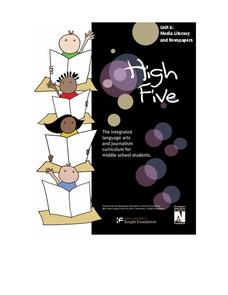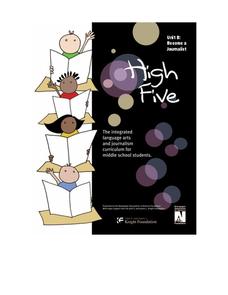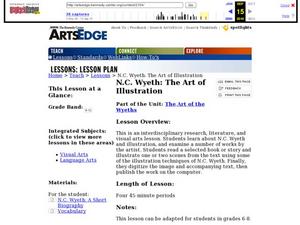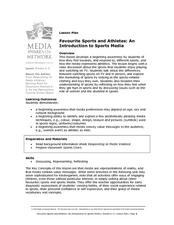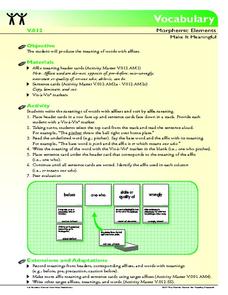Prestwick House
Understanding Language: Slant, Spin, and Bias in the News
We live in a time of fake news, alternative realities, and media bias. What could be more timely than an activity that asks class members to research how different sources report the same topic in the news?
American Press Institute
High Five: Media Literacy and Newspapers
Teach the five different types of media with the first of three in a media literacy unit. Learners create and propose a final newspaper project, which must address information covered throughout the unit.
PBS
Interviewing: The Art of Asking Questions
Interviewing skills are important, even outside of a news reporter's desk or employer's office. Take your class through the process of interviewing people they don't know with a set of case studies featuring journalists and various...
ProCon
Social Media
Facebook, Instagram, Twitter—are they good for society? Pupils prepare for a class debate in which they voice their opinions on the issue. They read the main pro and con arguments, explore others' opinions, view videos, and discover the...
ReadWriteThink
Critical Media Literacy: Commercial Advertising
Commercial advertising—we can't get away from it, but do we realize just how often we are being advertised to? With this lesson, scholars analyze mass media to identify how its techniques influence our daily lives. Learners browse...
American Bar Association
News Literacy Model Curriculum in Social Studies
Scholars investigate news literacy in the twenty-first century. They use technology, legal decisions, writings, and digital privacy to analyze the topic. Using what they learned, a group assignment looks into both the challenges and...
Curated OER
Nutrition and the Media: Cereal Box Consumerism
How many treats do you buy each week? Learners investigate diets and how the media tricks consumers into purchasing unhealthy snacks. They will investigate the designs and logos affiliated with cereal boxes and identify specific phrases...
Online Publications
Become a Journalist
Explore the newspaper as a unique entity with a detailed and extended unit. The unit requires learners to consider the newspaper's role in democracy, think about ethics, practice writing and interviewing, and examine advertising and news...
Center for Open Educational Resources and Language Learning
Reading Activity
Ready to integrate technology into your ELL instruction? Check out this reading lesson that has language learners using the Internet and apps, joining online book clubs, and creating blogs. A fine model of what can be done.
Curated OER
Rudyard Kipling's Rikki-Tikki-Tavi: Mixing Words and Pictures
Create meaningful illustrations to accompany stories in a web-based art and literacy lesson plan focused on "Rikki-Tikki-Tavi" by Rudyard Kipling. The class takes a virtual art safari with the Museum of Modern Art and then discusses how...
Turabian Teacher Collaborative
Parts of Argument III: The Claim Game
Throw down with a fun language arts game! Armed with a hand of writing-themed cards, learners craft arguments based on the strategies written on the cards, dropping cards as they discuss their claims further until there are no strategies...
Curated OER
Find The Hidden Message: Media Literacy in Primary Grades
Learners practice listening to and reading various types of media and text. In groups, learners use video, newspapers, magazines, and more to compare and contrast different types of information. They identify the differences between fact...
American Press Institute
Newspapers in Your Life: What’s News Where?
Big news isn't necessarily newsworthy everywhere! How do journalists decide what to cover with so much happening around them? A instructional activity on media literacy examines the factors that affect the media's choice of stories to...
Curated OER
Art of Illustration: N.C. Wyeth and Literacy
High school artists observe and research the illustrations and techniques of N.C. Wyeth. They read (and reread) stories and illustrate the texts using methods inspired by Wyeth's practice. Includes detailed instructional plan and useful...
Curated OER
How the Media Uses Polling Data in Presidential Election Coverage
Students research and analyze polling data in journalism. They discuss reasons that polling data is included in media coverage of presidential elections.
University of Kansas
Newspaper in the Classroom
Newspapers aren't only for reading—they're for learning skills, too! A journalism unit provides three lessons each for primary, intermediate, and secondary grades. Lessons include objectives, materials, vocabulary, and procedure, and...
Curated OER
Favorite Sports and Athletes: an Introduction to Sports Media
Even young children watch sports and like team logos and products. It's never too early to think critically about what's onscreen. This exercise develops awareness that media communicate values (i.e. who participates in sports and who...
Curated OER
Figurative Language
What is figurative language, and why do we use it? Introduce your high schoolers to some examples and discuss the importance of including this element in your writing. After studying a text and searching for examples, writers will...
News Literacy Project
News Judges
Order in the court! Scholars act as news judges, learning how to analyze the newsworthiness of several pieces of information. Working in small groups, they determine which events are most newsworthy and then complete graphic organizers...
News Literacy Project
Fighting Falsehoods on Social Media
It's time to stop misinformation in its tracks. Scholars take an online quiz to see how well they understand social media platforms' policies on spreading false information. After taking the quiz, pupils receive a score with an...
Newspaper Association of America
The News
Young journalists learn about topics such as newspaper ethics, parts of a newspaper, credible sources, and different types of articles. The lesson empowers individuals and gives them the capability to express their voices through the...
Teaching Tolerance
Social Media for Social Action
Engage in activism, not slacktivism! Scholars discuss social media and the Internet as tools for social change. Next, they engage in a close reading strategy called Thinking Notes as they read an article about social media activism.
Florida Center for Reading Research
Vocabulary: Morphemic Elements, Getting to the Root of It
Young readers learn how to get at the root of new vocabulary with this fun language arts activity. When working in pairs, children begin by matching unknown vocabulary words to their Greek or Latin roots. When all the vocabulary cards...
Florida Center for Reading Research
Vocabulary: Morphemic Elements, Make It Meaningful
Scholars learn to find meaning in words using affixes with a language arts activity. In pairs, children sort cards with printed sentences that include words with the prefixes mis- and pre- and the suffixes -er, -ness, and -able. Then,...



